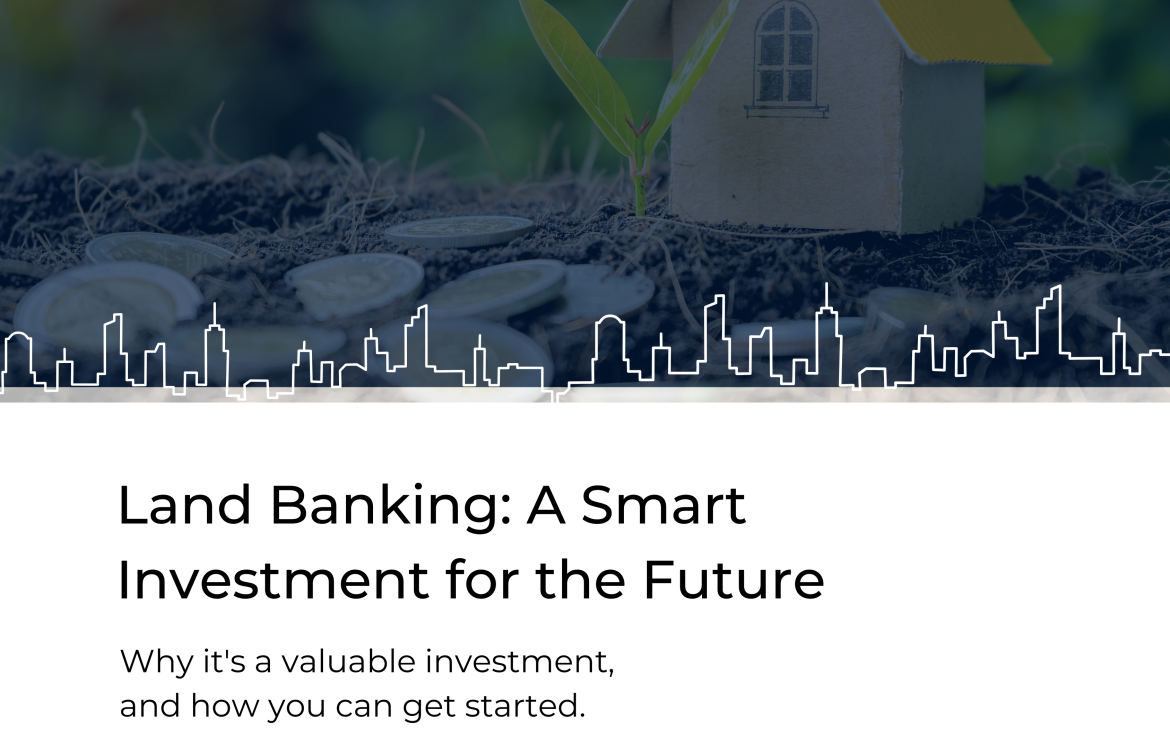
Land Banking: A Smart Investment for the Future
When thinking of long-term investments, land banking might not be the first thing that comes to mind. However, it’s becoming a highly effective and profitable strategy for investors looking to diversify their portfolios. This blog will explore what land banking is, why it’s a valuable investment, and how you can get started.
What is Land Banking?
Land banking is the process of purchasing undeveloped land in anticipation of future appreciation. Investors buy land that’s typically located in areas expected to experience growth and development, such as near cities expanding due to population growth or infrastructure improvements. The goal is to hold onto the land until its value increases, then sell it for a profit or develop it into something more valuable.
The Benefits
1. Appreciation Potential
The primary benefit of land banking is the potential for appreciation. As urban areas expand and land becomes scarcer, undeveloped land in key locations can become incredibly valuable. For example, in growing regions like Texas and Florida, strategic land investments have seen significant increases in value over the years.
2. Low Holding Costs
Compared to other types of investments, such as real estate development or property ownership, land banking has lower holding costs. Since undeveloped land does not require the same level of maintenance as buildings or rental properties, your ongoing expenses are limited to property taxes and insurance.
3. Diversification
Land banking can serve as an excellent way to diversify your investment portfolio. Unlike stocks or bonds, which can fluctuate with market trends, land generally increases in value over time as long as it’s strategically located.
4. Limited Supply
One of the key reasons why land banking is such a strong investment is the fact that land is a finite resource. As populations grow and cities expand, undeveloped land becomes increasingly scarce. This limited supply helps drive up prices in areas with high growth potential.
5. Generational Wealth
This is not only an investment for yourself but also for future generations. Owning undeveloped land can be a long-term legacy investment that appreciates in value over decades, providing financial security for your children or grandchildren.
How to Get Started
1. Research Key Growth Areas
The success of land banking relies heavily on selecting the right location. Investors should look for areas where there is potential for growth, such as proximity to upcoming infrastructure projects, new housing developments, or business expansion. Regions that are experiencing urban sprawl are often ideal.
2. Consult with Experts
Before purchasing land, it’s important to consult with real estate experts who specialize in land investments. They can provide insights into zoning regulations, environmental concerns, and market trends that could affect the value of your investment.
3. Understand Zoning and Development Restrictions
Zoning laws play a crucial role in the future development of your land. Make sure you understand local regulations and whether there are any restrictions on what can be built on the land. Some areas may have environmental protection laws that could limit development potential.
4. Look at Long-Term Trends
When considering land banking, think long-term. You may have to hold onto the land for several years or even decades before seeing a significant return. It’s important to have a patient mindset and be prepared to wait for the right time to sell or develop the property.
Potential Risks
1. Time Horizon
Land banking requires patience. Unlike stocks or other investments that can offer quicker returns, land banking may take years to pay off. Investors should be financially prepared to hold onto the land for a long period without any immediate returns.
2. Market Fluctuations
While land generally appreciates over time, it’s still subject to market fluctuations. Economic downturns or changes in zoning laws can impact the value of your land. Keeping a close eye on market trends and being flexible in your investment strategy is crucial.
3. Liquidity
Land is not as liquid as other assets like stocks. Selling land can take time, especially if you’re waiting for the market to reach a certain point. It’s important to be aware that your capital may be tied up for an extended period.
Conclusion: Why Land Banking is a Smart Long-Term Strategy
Land banking offers a unique opportunity to invest in one of the most valuable assets available: land. While it requires patience and long-term planning, the rewards can be substantial. By purchasing undeveloped land in key growth areas, investors can capitalize on future appreciation and potentially turn a significant profit.
Ready to start your land banking journey? Reach out to our team of real estate experts for personalized advice on where and how to invest.
Land banking isn’t just an investment—it’s a way to secure your financial future.

